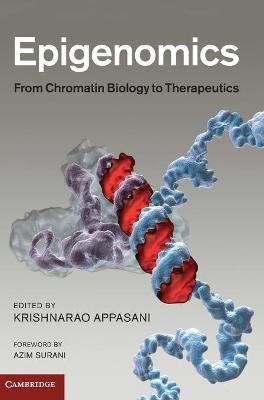
Epigenomics
Cambridge University Press (Verlag)
978-1-107-00382-8 (ISBN)
Understanding mechanisms of gene regulation that are independent of the DNA sequence itself - epigenetics - has the potential to overthrow long-held views on central topics in biology, such as the biology of disease or the evolution of species. High throughput technologies reveal epigenetic mechanisms at a genome-wide level, giving rise to epigenomics as a new discipline with a distinct set of research questions and methods. Leading experts from academia, the biotechnology and pharmaceutical industries explain the role of epigenomics in a wide range of contexts, covering basic chromatin biology, imprinting at a genome-wide level, and epigenomics in disease biology and epidemiology. Details on assays and sequencing technology serve as an up-to-date overview of the available technological tool kit. A reliable guide for newcomers to the field as well as experienced scientists, this is a unique resource for anyone interested in applying the power of twenty-first-century genomics to epigenetic studies.
Krishnarao Appasani is the Founder and Chief Executive Officer of GeneExpression Systems, a conference producing organization focusing on Biomedical and Physical Sciences. He is editor of MicroRNAs: From Basic Science to Disease Biology (2007) and RNA Interference: From Basic Science to Drug Development (2005), also published by Cambridge University Press.
List of contributors; Foreword; Preface; Part I. Basics of Chromatin Biology and Biochemistry: 1. Introduction to epigenomics; 2. Epigenetics and its historical perspectives; 3. Functional networks of human epigenetic factors; 4. Nucleosome positioning in promoters: significance and open questions; 5. Chemical reporters of protein methylation and acetylation; 6. Long non-coding RNA in epigenetic gene silencing; Part II. Epigenomic Imprinting and Stem Cells: 7. Active DNA demethylation - the enigma starts in the zygote; 8. Histone modifications of lineage specific genes in human embryonic stem cells during in vitro differentiation; 9. Epigenetic stability of human pluripotent stem cells; 10. Impact of CpG methylation in addressing adipose derived stem cell differentiation towards the cardiac phenotype; 11. Regulation of stem cell epigenome by REST; 12. MicroRNAs in embryonic stem cells; 13. Regulation of timing of replication; Part III. Epigenomic Assays and Sequencing Technology: 14. Detection of CpG methylation patterns by affinity capture methods; 15. Genome-wide ChIP-DSL profiling of promoter methylation patterns associated with cancer and stem cell differentiation; 16. Quantitative, high-resolution CpG methylation assays on the pyrosequencing platform; 17. DNA methylation profiling using Illumina BeadArray platform; 18. Advances in capillary electrophoresis-based methods for DNA methylation analysis; 19. Genome-wide methylome analysis based on new HT sequencing technology; 20. 3-D quantitative DNA methylation imaging for chromatin texture analysis in pharmacoepigenomics and toxicoepigenomics; Part IV. Epigenomics in Disease Biology: 21. Cancer classification by genome-wide and quantitative DNA methylation analyses; 22. Promoter CpG island methylation in colorectal cancer: biology and clinical applications; 23. The epigenetic profile of bladder cancer; 24. Genome-scale DNA methylation analyses of cancer in children; 25. The epigenetics of facioscapulohumeral muscular dystrophy; 26. Modulating histone acetylation with inhibitors and activators; Part V. Epigenomics in Neurodegenerative Diseases: 27. Study design considerations in epigenetic studies of neuropsychiatric disease; 28. Epigenetic regulation in human neurodevelopmental disorders including autism, Rett syndrome and epilepsy; 29. The neurobiology of chromatin-associated mechanisms in the context of psychosis and mood spectrum disorders; 30. Genome-wide DNA methylation analysis in patients with familial ATR-X mental retardation syndrome; 31. Kinases and phosphatases in the epigenetic regulation of cognitive functions; Part VI. Epigenetic Variation, Polymorphism and Epidemiological Perspectives: 32. Epigenetic effects of childhood abuse on the human brain; 33. X-linked expressed SNPs and dosage compensation; 34. Epigenomic diversity of colorectal cancer; 35. Epigenetic epidemiology: transgenerational responses to the environment; Index.
| Erscheint lt. Verlag | 2.8.2012 |
|---|---|
| Vorwort | Azim Surani |
| Zusatzinfo | 24 Tables, black and white; 24 Plates, color; 88 Halftones, unspecified; 12 Line drawings, unspecified |
| Verlagsort | Cambridge |
| Sprache | englisch |
| Maße | 175 x 253 mm |
| Gewicht | 1250 g |
| Themenwelt | Informatik ► Weitere Themen ► Bioinformatik |
| Naturwissenschaften ► Biologie ► Biochemie | |
| Naturwissenschaften ► Biologie ► Genetik / Molekularbiologie | |
| ISBN-10 | 1-107-00382-2 / 1107003822 |
| ISBN-13 | 978-1-107-00382-8 / 9781107003828 |
| Zustand | Neuware |
| Haben Sie eine Frage zum Produkt? |
aus dem Bereich


